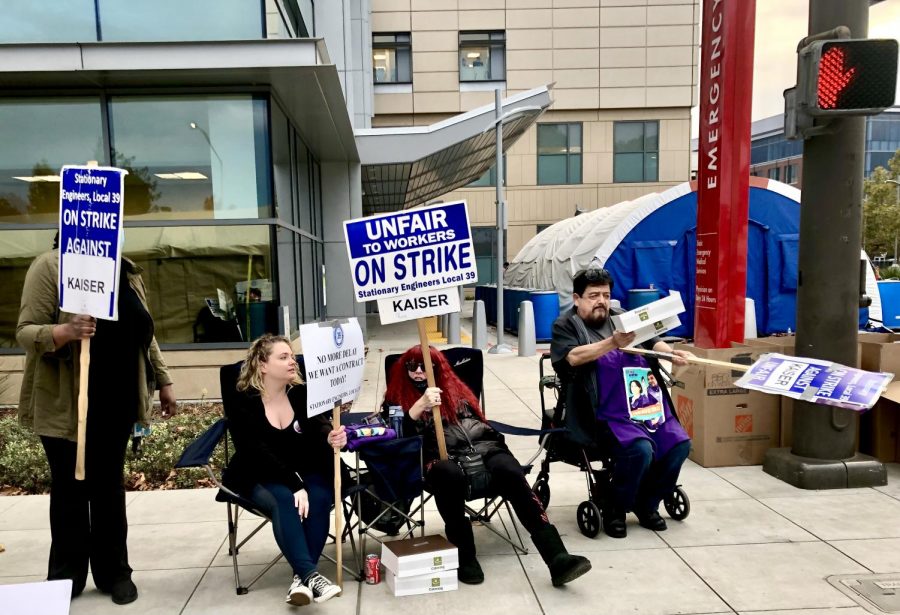As vehicles in accumulating traffic pass by, the sound of car horns fills Veterans Blvd. in support of Kaiser Permanente stationary engineers striking for higher wages.
Tens of thousands of Kaiser nurses and medical assistants joined stationary engineers this past week in sympathy to show their support for Local 39’s strike for higher pay.
Larry Owens is one of the tens of thousands in a union supporting Local 39.
“Kaiser needs to be fair. The pay increase [stationary engineers] are asking for isn’t a lot, and it’s what they need to do things like feed their families and pay for gas,” Owens said.
Owens joined the sympathy strike on Nov. 18 for Kaiser stationary engineers who had been striking since Sept. 18. The protesters held up signs with phrases like “We want fair wages!”
Michael How is a stationary engineer for Local 39. He has been on strike seven days a week for the past nine weeks and is not planning to stop until Kaiser meets what he and the rest of Local 39 believe to be “the cost of living” in the Bay Area.
“[Kaiser] hired us because we are the best. So, we moved here, and now we need to be paid the cost of living, just so we can cover bare necessities. We haven’t been paid the cost of living recently,” How said.
The cost of living in the Bay Area is one of the highest in the nation. This means that people with technical blue-collar jobs like stationary engineers can have difficulty supporting a family in the Bay Area.
“Stationary engineers are just asking for an increased salary to take care of their families,” Owens said.
In a statement responding to the strikes on Sept. 19, Kaiser stated, “Across Kaiser Permanente in Northern California, our [stationary] engineers earn an average of $120,000 a year.”
An hourly wage of $56.45, according to USFCA Human Resources, adds up to an annual salary of around $117,400 per year. This salary is good compared to other technical blue-collar jobs in the area. Additionally, the engineers have benefits including medical benefits and pensions, which Kaiser says brings the total compensation to over $180,000 per year. However, some Local 39 members assert that it is not enough money to support their families comfortably.
The development of sympathy strikes brings a burden to many Kaiser staff members. Kaiser had to look for substitute stationary engineers and other medical staff to replace striking employees.
Kaiser sent out an email to all members this week explaining how the strikes could affect patients. Some optical, radiology, and pharmacy services were temporarily closed. Emergency services remained open but were still impaired by the strikes.
“Some outpatient pharmacies will be temporarily closed from November 18 and 19. If a member does not need their refill right away, any closed pharmacies will reopen on Saturday, November 20,” Kaiser said.
The closing of pharmacies in the past week resulted in floors and hallways of some Kaiser hospitals being nearly empty, allowing for shorter wait times for those getting COVID-19 tests or picking up over-the-counter medication.
One Kaiser member, John Manning, noticed the change in wait times for the Kaiser pharmacy.
“I was picking up a few things I got prescribed to me online. When I went to the pharmacy, it was probably the quickest the line has ever been,” John Manning said.
Although Local 39 members and Kaiser corporate staff significantly disagree about engineer wages, they can agree on one thing.
“We have plans in place to ensure [patients] continue to receive safe, high-quality care during this period,” Kaiser released in a recent statement.
How and other stationary engineers agree about the safety of Kaiser patients.
“At the end of the day, you’ve gotta think about the patients. I hate being out here knowing someone else could get hurt without us,” How said.













